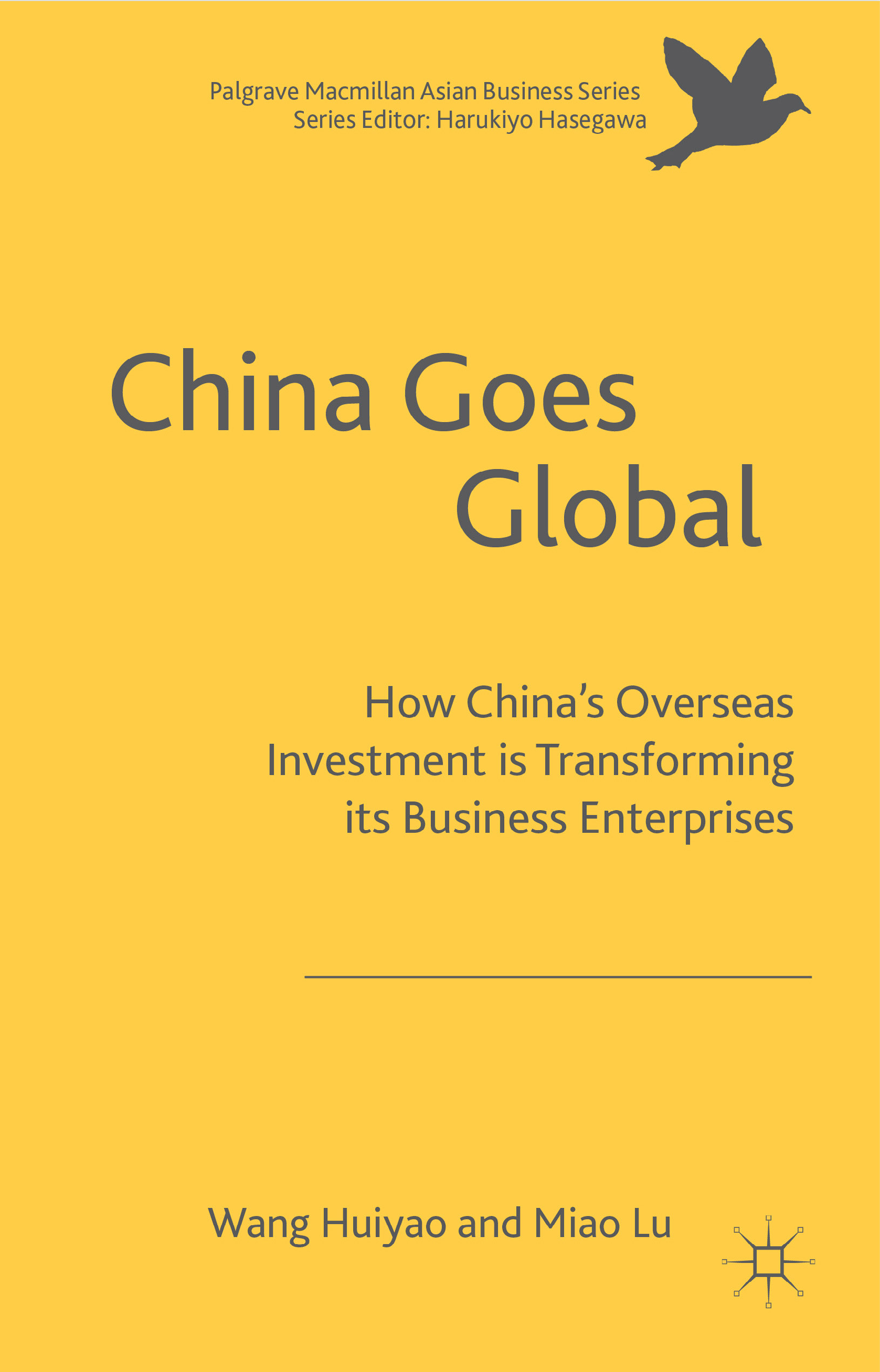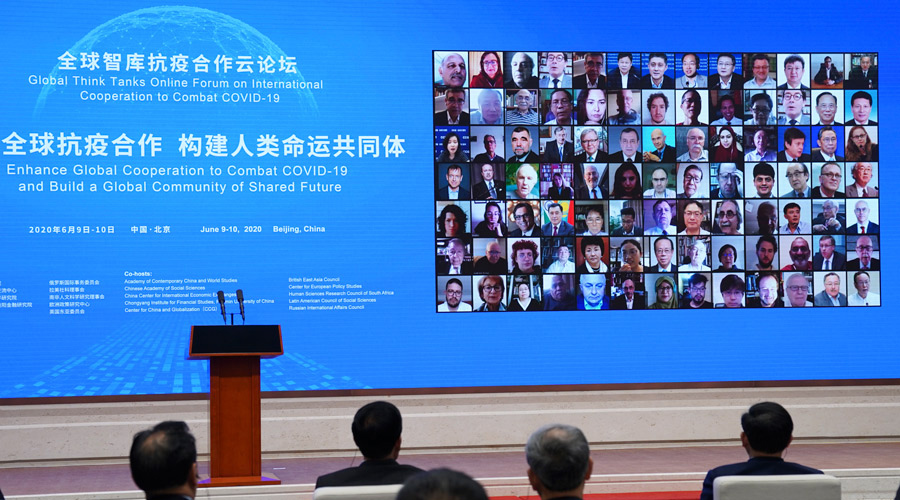王辉耀博士、苗绿博士著作《中国走向全球:中国的海外投资如何推动企业的转型》

《中国走向全球:中国的海外投资如何推动企业的转型》
China Goes Global: How China’s Overseas Investmentis Transforming Its Business Enterprises
作 者:王辉耀博士、苗绿博士
出版社:帕尔格雷夫·麦克米伦
Authors:Dr. Wang Huiyao and Dr. Miao Lu
Publisher: Palgrave Macmillan UK
中国大陆的企业正迈向国际化,中国正在从制造业出口平台转变成海外投资强国。本书对迈向国际化并加速海外投资活动的中国企业进行了深入的实证分析,详细分析了有关行业、渠道、海外目标和具体公司的宏观趋势,以及中国政府政策在促进企业全球化过程中所扮演的角色。该书让读者从企业的视角去看中国的海外发展,它不仅关注名企,也重视不太为人所知但同样重要的开拓性企业。该书为企业提供了实用的建议,帮助它们克服向外发展所遇到的挑战。
“近年来,中国的企业正‘走向全球’,并且大规模地扩展海外投资活动的范围。王辉耀和苗绿精辟地回顾了世界经济的主要发展,通过广泛的调查和收集大量的数据对中国企业全球化提供一个严谨和宏观的概括。这些特点使《中国走向全球》具有很大现实和理论意义。”
— 龙永图,中国入世谈判首席谈判代表、原国家外经贸部副部长、
中国与全球化智库(CCG)主席
“《中国走向全球》是一本很重要的书。它让我们关注一个很多商人都忽略或低估其后果的新现实:中国在国外公司的对外投资最近已经超越了国外对中国的投资!这本书对每年多于1000亿的中国对外投资进行实证分析。它考虑了投资者所遵循的不同模式,提供案例和排名,并指出中国投资者改进人才并购能力的必要性。中国在全球经济的地位正在发生变化,而这本书恰恰就让我们更了解这个转变。
— Paul W. Beamish,加拿大西安大略大学商学院亚洲中心主任
“这本书证据充分并具有说服力,是一本任何有兴趣理解中国走出去战略这个变革性现象及其影响的人都应该看的书。”
— 刘宏,新加坡南洋理工大学人文与社会科学学院院长
“随着中国通过升级经济发展模式来推动企业的全球化,我们必须仔细分析和总结其中的成功经验,让其他有意向海外扩展的中国企业学习和借鉴。王辉耀和苗绿就是带着这些目标去完成这个有关企业全球化的全面研究项目。这本书对于那些有意走向国际化的企业非常有用。”
— 曹德旺,福耀玻璃集团创始人和董事长
“王辉耀和苗绿对中国全球化的研究做出了重要的贡献。在这本书中,作者分析了中国全球化的背景,包括中国企业家和公司所曾经采用的其他模式。王博士和苗博士为中国全球化企业发展了一套独特和必要的排名制度,并列举了排名领先的企业。他们在书的结尾中讨论中国企业所面临的挑战,也探讨了企业领导如何以新鲜、创新的解决方案来应对这些挑战。”
— Ilan Alon,挪威阿哥德大学《国际新兴市场学报》主编
“王辉耀和苗绿适时、前沿和全面的调查研究展示了有关中国海外直接投资的模式、测量矩阵、理论和多个案例。任何想了解中国在未来几十年对全球经济潜在影响的人都应该读这本书。”
— DavidZweig,香港科技大学人文社会科学学院副院长、中国跨国关系中心主任
“这本书恰当地总结了我们所见证的重要转折点。中国的对外直接投资已经超越了所吸收的直接投资。国际货币基金组织也批准了人民币被纳入其储备货币。王博士和苗博士在这本书中提供了丰富的案例和前50名排名名单,对有关中国企业全球化的动态研究做出很大的贡献。随着中国的海外活动融入并成为全球经济增长轨道的一部分,我们期待每年对前50企业的发展以及新企业的出现进行跟踪和补充。”
—张伯赓(JulianChang),“中国走向全球化”协会创始人、
哈佛大学肯尼迪学院艾什中心前执行主任
1. 学术背景
关于中国对外投资的二次文献以及这本书
此中国外国直接投资研究的特点
这本书的结构与章节概括
2. 中国企业全球化概况
背景
全球FDI的现状与特征
中国企业全球化的困难
推动中国企业全球化的建议
小结
3. 中国企业全球化的十大战略
介绍
环境因素分析
中国企业全球化的十大战略
小结
4. 评估制度和排名
评估中国企业全球化的理论研究
中国企业全球化的评估制度
各因素的权重
小结
5. CCG推荐的中国企业全球化排名
中国企业全球化的前50名排名:知名的全球化企业
全球化表现突出的前10名中国企业(2012-2013)
进行跨境收购兼并的前10名中国企业
前50名全球化的新中国企业
领先的全球化中国企业:总体概括和趋势
前50名全球化的新中国企业案例
附录:前10名进行跨国收购兼并的中国企业的收购兼并活动
6. “走向全球战略”与国际人才
中国企业“走向全球”的现状和问题
影响中国企业海外投资的全球人才短缺现状和起因
对国际人才在跨国商业运营中扮演的角色缺乏了解
如何训练和引入国际人才
7. “走向全球”的挑战和战略
主要中国对外直接投资所面临的挑战与可采取的应对措施
中国对外直接投资所面的挑战与应对措施:地区视角
中国海外收购兼并的其他挑战和应对措施
8. “一带一路”和中国对外投资的未来方向
一带一路和中国在全球经济治理中日益重要的作用
对中国对外投资的影响
风险和应对措施
附录:中国对外的外国直接投资的统计概况与分析
中国企业外国投资案例(2012年1月-2014年6月)
注释
索引
中国企业外国投资案例

王辉耀博士,中国与全球化智库(CCG)主任,国务院参事,西南财经大学发展研究院院长、教授、博士生导师,欧美同学会副会长兼建言献策委员会主任,商务部中国国际经济合作学会副会长,九三学社中央经济委员会副主任。王辉耀博士曾经担任哈佛大学高级研究员,布鲁金斯学会访问研究员,北京大学光华管理学院、加拿大西安大略大学等多家国内外大学兼职教授,还担任了国际移民组织(IOM)顾问理事会理事,国际大都会国际执委会委员,国际猎头协会顾问,耶鲁大学亚洲发展理事会成员,加拿大毅伟商学院亚洲董事会成员和德国IZA研究所研究员等职务。他在人才战略、企业国际化、国际管理、创业创新、华人华侨与中国留学人员群体和智库研究等领域有广泛的学术研究,发表有关中英文著作60部和有关中英文专业文章上百篇。他也是CCG发布的《中国企业全球化报告》、《中国海归发展报告》、《中国留学发展报告》、《中国国际移民报告》、《中国区域人才竞争力报告》、《海外华人华侨专业人士报告》等权威蓝皮书的作者。

苗绿博士,中国与全球化智库(CCG)联合创始人兼秘书长、中国国际人才专业委员会副秘书长、北京师范大学国际写作中心副总干事。苗绿获得北京师范大学当代中国研究博士学位,曾在美国纽约大学和哈佛大学担任访问学者。她也是CCG发布的《中国企业全球化报告》、《中国海归发展报告》、《中国留学发展报告》、《中国国际移民报告》、《中国区域人才竞争力报告》、《海外华人华侨专业人士报告》等权威蓝皮书的作者。
China Goes Global
This year China will become, for the first time in its history, a net exporter of capital. The country is once again re-inventing itself economically, shifting from being a manufacturing export hub into an overseas investment powerhouse. CHINA GOES GLOBAL is the most thorough and up-to-date empirical analysis of the accelerating effort of Chinese companies to go global by investing overseas. As such it details the overall trends of this activity with respect to its sectors, channels, overseas targets, and particular firms, along the role of Chinese Government policy in facilitating business enterprise globalization.
CHINA GOES GLOBAL offers a thorough enterprise level examination of this phenomenon by reviewing in detail the specific firms driving the outward expansion of Mainland China business. The centrepiece of this effort is the various rankings in Chapter 4 of Chinese firms with respect to globalization. These include rankings of the top 50 established globalizing firms, top 10 globalization performers, top 10 firms with respect to cross-border M&As, top 50 overseas listed companies, and top 50 up-and-coming globalizing firms. In the case of the last group of companies, this chapter also provides capsule case studies of their going global initiatives. At the same time, Chapter 2 sets forth 10 models of Chinese enterprise globalization based on detailed case studies of well-known and not so well-known Chinese companies. Thus, CHINA GOES GLOBAL is notable for offering readers an enterprise level of view outward expansion by Chinese firms that is focused not only on the big-name firms, but less well-known but equally important trailblazing enterprises in this area as well.
In addition to assessing the progress of Chinese companies in going global, this book details the considerable improvements that still need to be made in key areas, especially the integration of suitable managerial talent. CHINA GOES GLOBAL offers practical suggestions on how firms can tackle this challenge and other problems in expanding outward.
This book therefore serves as a valuable report card on Chinese enterprise globalization. For scholars, policy-makers and intelligent layman alike, it will be an indispensable primer on an emerging trend that is reshaping global business and the world economy.
Upgrading Chinese Business Enterprise Globalization
Since the Reform and Opening Up policy, China’s economy has undergone 36 years of extraordinary growth. Economic globalization and the rising competitive strength of China’s economy has played a particularly important role in spurring Chinese companies to expand their foreign direct investment (FDI) and accelerate their transformation into global firms. Since China joined the WTO in 2001, the average annual growth rate of FDI has been as high as 36.5%. In 2013, China’s FDI topped 100 billion Yuan for the first time. As of July 31, 2014, the total stock of Chinese FDI amounted to $713 billion. In every area- scale, scope, form, and diversity-China’s FDI has made significant progress.
The FDI activity of Chinese enterprises has been referred to as their “Going Global” strategy. China now sees global economic development as an integral part of transforming and upgrading its economy. This strategy will enable China to expand its room for development in a globalized world, improve the level of international competitiveness, and promote sustainable economic growth. Implementing the “Going Global” strategy can not only help develop new international markets and expand exports for Chinese firms, but also boost the international profile and influence of those companies. That, in turn, will lead more Chinese enterprises to participate in international economic cooperation at a deeper level.
In the past, the internationalization of Chinese enterprises occurred mainly through the introduction of foreign investment in China. Such investment forced Chinese domestic firms to compete with non-Chinese companies on China’s domestic market, forcing them to improve their competitiveness vis-à-vis these foreign rivals, thereby serving as important first step in successfully operating on the international market. Now China’s enterprises are starting to “Go Global”. By investing directly abroad, the Chinese firms are actively restructuring the overseas market to fully exploit and utilize global resources and markets. In so doing, these companies have become more and more globalized in their operations. We are pleased to see that through finely honing their practices in this area, a growing number of Chinese companies have been able to integrate global resources with a global perspective. Some are now even involved in leading the global value chain and have gradually developed into highly competitive multinational enterprises with strong core competencies and other strengths. Creating and developing more such companies will greatly deepen China’s participation in economic globalization and make its economy an integral part of this worldwide process.
In short, accelerating the pace of Chinese enterprises “Going Global” is not just an inevitable trend in the general development of economic globalization. It is also necessary for the development of China’s economy at this point in time. Vigorously promoting the greater involvement of Chinese enterprises in the foreign investment process is a task which cannot be delayed.
The Third Plenary Session of the 18th Central Committee of the CPC strongly endorsed this view, calling upon “Enterprises and individuals to directly invest abroad.” The statement added, “Enterprises and individuals are permitted to develop overseas investment based on their own advantages. They are allowed to take risks in all the countries and regions to develop engineering or labor cooperation projects. And they can use innovative methods to undertake overseas expansion involving Greenfield investment, mergers and acquisitions, securities investment,, joint venture investments, and the like.”
This declaration has cleared the way for Chinese companies and individuals to go global and develop and expand FDI. In addition, the National Development and Reform Commission, the Ministry of Commerce, and other key Central Government Ministries have also issued relevant policies to encourage FDI. China is thus now beginning to experience the rapid growth of its FDI, which will usher in new development opportunities. Against the backdrop of a slowly recovering global economy, new modes of technical cooperation and industry transfer are brewing, and countries around the world have high expectations for capital inflows from China. With nearly $4 trillion in foreign exchange reserves, China currently has a great opportunity to develop FDI both as a way of conforming to the objective laws of economic development and to meet the needs of its domestic economy and the world economy. The convening of the Third Plenary Session of the 18th Central Committee of the CPC has thus embraced the idea that the expanding FDI activity of Chinese firms is opening up a new era for the China, particularly its place in the accelerating trend of economic globalization.
But compared with western developed countries, China’s FDI stock is still relatively low. As an economy superpower with more than 1/5 of the global population, 10% of the global GDP, and 15% of FDI inflows, the Chinese FDI stock now only accounts for 2.4% of the world’s total FDI stock. All of the world’s global economic superpowers are well-known for being FDI giants. Thus, despite being the second largest economy in the world, China’s FDI stock is not yet commensurate with its new-found global economic status. Given this disjuncture, we should study harder the successful experiences of other countries in undertaking FDI to carry out effective multilateral cooperation with different actors across various issues. This will provide a vital reference point for Chinese enterprises as they seek to go global. More importantly, the China’s Government must accelerate the implementation of foreign investment legislation and multilateral investment agreements to provide protection and support for the outward expansion of Chinese enterprises. Research institutes and think-tanks need to do deeper research on FDI to provide intellectual support for companies going global. There is no doubt that by stepping up their FDI activities, Chinese firms can further enhance their international competitiveness and become more globalized. However, doing this will require greater effort from China’s Government and more multilateral cooperation.
Studying the issues related to FDI is of great significance to the globalization of Chinese enterprises. The Chinese International Economic Cooperation Society and CCG has gathered experts and scholars as well as prominent entrepreneurs, heads of major companies, and other business movers and shakers, both at home and abroad, in the field of transnational investment. These individuals combine cutting edge thinking, rich knowledge, and vast practical experience regarding the efforts of Chinese firms to expand outward in the context of an increasingly globalized world economy. Drawing upon a large sample of interesting and significant case studies, the group undertook systematic research regarding worldwide FDI in order to solve the major practical problems Chinese firms face in going global. This book grew out of these efforts.
China Goes Global includes a large number of surveys and is supported by extensive data to provide a rigorous and systematic comprehensive picture of the current situation of Chinese enterprise globalization. In particular, it analyzes the problems and risks confronting Chinese firms in going global and reviews success stories of their doing so to provide good suggestions for devising effective FDI strategies. This book is therefore clearly very useful for firms seeking to navigate their way through the current complex international economic and trade environment. It will help these companies avoid various risks associated with undertaking FDI in overseas countries by offering specific advice on how to better participate in international competition abroad. For this reason, the report has crucial theoretical and scholarly as well as practical significance.
On the basis of a large number of case studies, the book also provides a rigorous system for evaluating the internationalization efforts Chinese enterprises. This yardstick is based on their use of overseas talent, markets, social responsibility, industry chain management, and cross-border merger and acquisition activity. The evaluation system also uses popular international indexes such as assets and performance. The evaluation system of Chinese enterprise internationalization is very scientific and highly innovative, fully reflecting the degree to which a firm has effectively internationalized while conducting FDI and the overall quality of its efforts in this area. The evaluation system was used to determine the top 50 Chinese companies going global. These firms serve as role models in effective internationalization and provide an important reference point for other Chinese firms in expanding overseas. At the same time, those involved in this report selected the top 50 new Chinese enterprises undertaking globalization. This ranking is designed to encourage other smaller firms with limited experience in expanding overseas to also go global
The current international political and economic situation is certainly very complicated and unstable, and this makes the globalization of business firms a complex and difficult undertaking. Even some very well-known experts and scholars are sometimes unable to accurately predict its outcome. For that reason, the indexes of the evaluation system for China’s enterprise internationalization in this report will be constantly updated and improved over time. We thus hope that the people from all walks of life, especially the entrepreneurs with practical experience in doing business on the global market, can put forward their own valuable input regarding our ongoing work on the globalization of Chinese business enterprises.
Chairman of CCG and former chief negotiator for China’s entry into the WTO,
Long Yongtu
“China businesses are going global, transforming the country from a manufacturing export platform into an overseas investment powerhouse!”
Long Yongtu, Chief Negotiator, China’s Entry to WTO, Former Vice Minister, Ministry of Foreign Economic Cooperation and Trade, Chairman of CCG
“China Goes Global is an important book. It draws attention to a new reality which many business people have either missed, or underestimated in terms of implications: Chinese outward investment in foreign companies recently exceeded that of foreign investment in China! This book empirically examines Chinese foreign investment that exceeds $100 billion annually. It considers the various models followed, provides examples and rankings, and acknowledges the need for Chinese investors to improve their talent acquisition ability. Another transformation is underway regarding China’s place in the global economy. This book helps us better understand it.”
Paul W. Beamish, Ph.D.
Canada Research Chair in International Business,
Ivey Business School, Western University, Canada
“Well documented and convincingly presented, this book is a must read for anyone interested in understanding the transformative phenomenon of China’s going out strategies and their policy implications.”
Liu Hong, Ph.D.
Chair, School of Humanities and Social Sciences, Nanyang Technological University, Singapore
“As China seeks to upgrade its economic growth model by globalizing its business enterprises, we need to examine carefully and sum up the experiences of internationalization success stories that can serve as models to guide Chinese enterprises trying to go global. It is with these aims in mind that Wang and Miao have undertaken and published this comprehensive research project on the globalization of Chinese business enterprises. This book is very useful for firms intending to go global.
Cao Dewang, Founder and Chairman, Fuyao Automotive Glass, China
“Huiyao Wang and Lu Miao have made a singular contribution to the study of Chinese globalization. In this well researched book, the authors examine the background of the globalization of China, including alternative models that have been used by Chinese entrepreneurs and businesses. Dr. Wang and Dr. Miao develop a unique and much needed ranking system for China global enterprises and recommends a list of top performers. They end the book with a discussion of challenges facing Chinese companies and how business leaders in China might approach these challenges with new, innovative solutions.”
Ilan Alon, Ph.D.
Professor of Strategy and International Marketing
Editor, International Journal of Emerging Markets
School of Business and Law,University of Agder, Norway
“Wang and Miao’s timely, cutting edge and comprehensive study presents models, measurement matrices, theories and numerous cases studies of China’s overseas direct investment. This book is a must reading for anyone wanting to understand China’s potential impact on the global economy in the coming decades.”
David Zweig, Ph.D.
Chair Professor, Division of Social Science
Director, Center on China’s Transnational Relations
Hong Kong University of Science and Technology
“This timely book aptly sums up the important watershed we have just witnessed: China’s outbound direct investment has surpassed inbound direct investment and the IMF approved the Yuan’s inclusion into its basket of reserve currency. Dr. Wang and Dr. Miao have done a great service for the dynamic research on Chinese companies’ going global by providing a wealth of case studies and the Top 50 lists in this book. We look forward to annual supplements tracking the development of those top fifty companies, and the emergence of new ones, as China’s overseas activities become an integrated and routine part of global economic growth.”
Julian Chang, Ph.D.
Founding President, Chinese Globalization Association
Dean, Aitia Institute, IMC Group.

Dr. Wang Huiyao is the Founder and President of CCG and also serves as a Counsellor of the China State Council Office. He has published nearly 50 books and over 100 articles on China and globalization, focusing on the worldwide circulation of Chinese talent and Chinese firms investing abroad.

Dr. Miao Lu is Executive General Secretary for CCG and the China Global Talent Society of the Ministry of Human Resources and Social Security. She has been a visiting scholar at New York University’s China House and the Fairbank Center, Harvard University, and published books on Chinese talent circulation and global think tanks.





